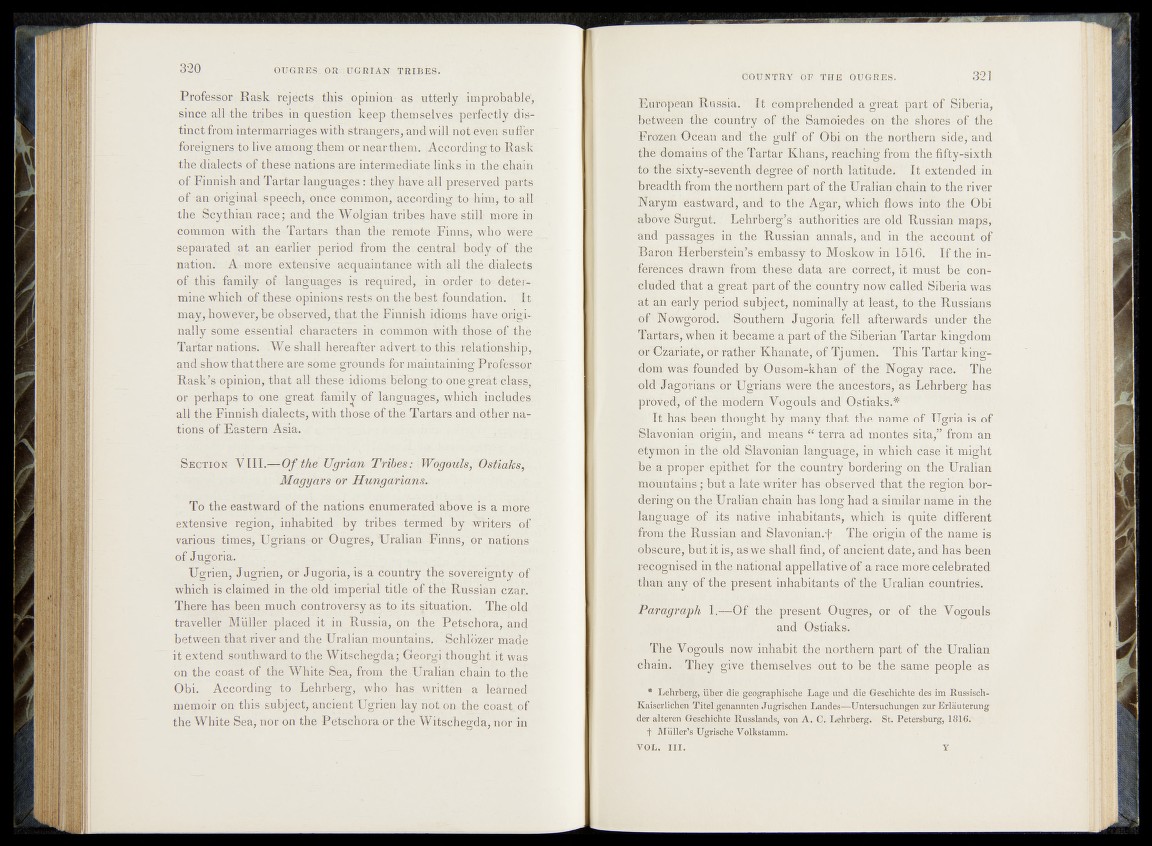
Professor Rask rejects this bpiuióp' as : utfèdy;v^p;rQ.fyahl(?,
since all the tribes im||pestiön keep themselves -perfectl$j|i^;
tinct frórti intermarriages with strangers, and. will, not ëyfep suffer
foreigners, to livè'among-them or. near them, ‘ j Accord ing'to Ra’sk
the dialeets of thesènations are intendedi ate .link s* in the.chaih
of Finnish and T arïar 1anguagès; they have a|J preserved* paris
of am original -speech,! otech common, accordin$£itq:rhim, to all
the Scythian race; and the Wolgian tribeshave atrlb more,in
Common with the-Tartars than the* remote îFinnsÿ
Separated.,at an earlier period-froth the^central1 bodyioffthe
nation. A--more.extensive ahqriain tancé with-al! thé dialects
of this family-of languages is; required, in. .-order %tQïdsçtei-
mine which of these opinionsjesls on t h e ï s t , foundation: It
nÈ^^rhö^Wer, he observe^, that,thé Finnish idioms havc^origi-.
nally some essential characters in éOmmöri-With thqse of thé
Tartar nations. iWe shall hereaftériadvertïto'fthis^relatipnsj^ip,,
and show that there are .some grounds for maintaining, Professor
Rask’s opinion, that all theses idioms belong to oneg!^j&hl®ss,
or perhaps to one great family of languages,-which include^,
all the Finnish dialects, with those of the Tartaçs»and 'Other nations
of .Eastern Asia. Js
Section VIII.-—O f the Ugrian Tribes: Wogouls, Ostiafcs,
Magyars or Hungarians*
To the eastward of the nations enumerated^boyeJin mote
extensive region, inhabited by tribes termed by -waiters 'of
various, times, Ugrians,or Ougres, Uralian Finns, or nations?
of Jugoria.
Ugrien, Jugrien, or Jugoria, is a country .the soyereignty-of'
which is claimed in the old imperial title of. the Russian c z a r .
There has been much controversy as to its situation. The old
traveller Miiller placed it in Russia, on the Petschora, and
between that river and the Uralianj'nountains. Schlozer made
it extend southward to the Witschëgda; Géorgi thought it was
on the coast-of the White "Sea, from the Uralian chain'to the
Obi. According to Lehrberg, who has written a learned
memoir on this subject, ancienfUgrien. lay not on. the coast of
the White Sea, nor on the Petschora or the Witschegda, nor in
Ea^b^can RusMa. I Pcdtripfehénded a great part of Siberia,
d$ftvfe|fi' thé cdüntry %frme Samoiëdc^ph’ the shores # f the
Frozen Oje'daiï andp';t-fë'® g’tilP of Ohiloh the northern side, and
the domains'èf the Tartar Khans*, r^aèKitfg/|^Grafthé?fifty-sixth
tö thëf sikty-leventh dp ^ ^ wtnofth 1'atitude. It extended in
brëadth from thé nörthérhparl^l^^WrMian chain to thé river
,JNhrym eaètward', ditd'tb 't l ^ ^ '^ ^ l ^ i c l i flowS^into ,the Obi
abov$ SurgiH'lk? Lelirbe’fg-^ are old* RuSslah mhips;
and*p'a^'è^éé” in the RiftManf a § |l i a l s ? i th e v t r a c p p n t of
,-Bèron HernëVltëih%' éflïMs^.to IfTmï mfS'ó&
jSës drawn* from thé|efcdhta* ar^cWn'é'ct, it xibilt-tIS*(■on*
eluded that H'^leaPpart of flie|iC0untry now-hal^d^Siberia was.'
at an early përiod |iifiject, nordirially dtcflpp^^ö'-the Russians
of N’mv^ofetlc ^Sèufhern .fujl^fia1' fen^aftei;wWh¥*%ider' ih è
'Tartars, whéri' it becatóe hr mefSiherian Tartar kidgMwi
oi^OMfiate, or father Kharièfé||)f Tj urnen." ‘This’ Tartar kïnjf-
ddrii 'Wa-s-fonmlèd' bylOusom-kban of thé'-^o^t^^acc. ‘|^hH
old griiÖf# whr’e the ance^lfor^fnslEehlb^ffi, h as
pïovè^^Pphè mlSdlrrrVlSgBü'Ts arid' Ostiaksf|pi|
It-Has been thMgfht B^ Jmany that thC\m^1nnof s of
Slavonian origbVaifd mêaoïs <lC terraif a-d n^pjte^I^ra,.^Trq^^an
etymo# in ’thê?ëjd;Slavonian langhasjgin ‘whiBfj^ease .it might
„be a prOphr'Cpirthct'Tor' the rcöuntr^l3h^.^fihg':ori The Uraiia'ri
mountains'-; but a laté’writer has observed that the region bör-
dering o.n the Uralian chain hasTdng had a similar name in the
langOagékpf its nativé' jiqhabitarifö,’ which is J quite different
from the Russian and Slayonian.-f^ - Thferirigii^ of tjhe name^is
*||iscure, but ijtTS;, aswe shali find, of.ancient dale, and has been
recognised in the national appellativo^F a;Tate rrioré celëbrated
than any of the present inhabitants of th^Uralian’ c'Qünfriëk?
Paragraph 1.—-Of' the present. Ougres, or óf the Vogouls
and Ostiak's^5
The Vogouls riow inhabit th&lhórthéin1 part of'the Uralian
chain. - Thëy gjTe' themaelveSf;oTit tó ‘Bé theffsame people as
• Lehrberg, liber die geographisphe Lage und die Geschichte des inj Russiseh-
Kaiseriichen Titel gehannten Jugrischen Landes—Unterguchuligen zur Erlauterung
der alteren GesGhichte Russlands, von A.C,; Lehrberg. . St. Petersburg, 1816/ ö.
f y t f Muller’s Ugrisèhe Volkstamm.
VOL. III. Y